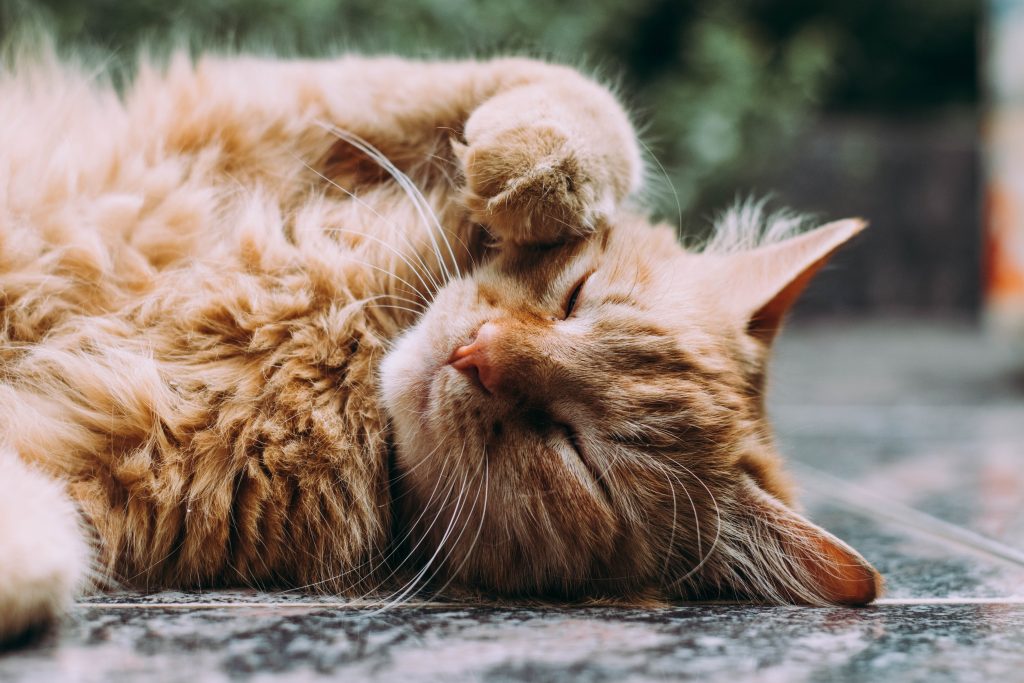Bladder infection in cats
Oops, has the cat peed on the couch? That’s unpleasant. Not only for you, but possibly also for your cat. When cats suddenly start peeing in ‘odd’ places, there is often a reason for it. In most cases, this behavior is caused by a bladder infection.
What is a bladder infection?
Bladder infection is the most common bladder problem in cats. With a bladder infection, the inner wall of the bladder is inflamed. Besides the fact that this can be painful, it causes the cat to have a constant urge to urinate. The inflammation can also cause the bladder wall to bleed, with blood ending up in the urine.
Different types of bladder infections
Sterile (idiopathic) bladder infection
A sterile bladder infection is an infection which is not caused by bacteria. We also call this an idiopathic bladder infection. It is not always clear what causes the infection, several factors can play a role. Idiopathic bladder infection is the most common variant (60% to 70% of the cases).
Bacterial bladder infection
A bacterial bladder infection; the name says it all. This variant is caused by a bacterium. As cats get older or when cats have certain underlying problems, such as kidney problems , diabetes or an overactive thyroid , the chance of a bacterial bladder infection increases slightly. However, this rarely occurs in cats.
Bladder grit and bladder stones
By nature, cats drink little. This makes their urine very concentrated. This can increase the chance of bladder grit and bladder stones. Bladder grit are microscopic crystals that are present in the cat’s urine. This grit irritates the bladder wall, which leads to a bladder infection. A bladder stone is formed by a large accumulation of grit and can vary in size from a few millimeters to a few centimeters. Bladder grit and bladder stones can both lead to a bladder infection.
How does bladder infection develop in cats?
There can be various causes for bladder infection, unfortunately it is not always possible to trace what the exact cause is. Factors that can contribute to the development of bladder infection are:
- Stress
- An abnormality of the mucus layer in the bladder
- Overstimulated nerves in the bladder
- Lack of fluid intake
- Overweight
- Litter box related problems (anxious, hygiene, placement)
What are the symptoms of a bladder infection?
You can recognize a bladder infection in your cat by the following symptoms:
- Peeing outside the litter box/peeing in the house
- Painful/meowing while urinating
- Urinating more often and less production of urine
- Blood in the urine
- Frequent washing of vagina/penis
- Restless behavior
- Persistent urge
Please note: if your cat has a persistent urge to urinate but he produces no urine; call the vet immediately. This could be an emergency!
Diagnosis of bladder infection
In order to diagnose bladder infection, the cat’s urine must be examined. You can initially try to collect a urine sample at home. You can do this by filling the litter box with special plastic litter granules (such as Katkor). The granules do not absorb the urine. Use a pipette or syringe to suck up the urine between the granules. If your cat urinates on the floor, you can also suck it up with a syringe. For a good test result, it is important that the urine is as fresh as possible. Therefore, make sure that the urine is at the vet within 2 hours for the examination.
If you are unable to collect the urine at home, it is also possible for us to collect the urine directly from the cat’s bladder. In that case make sure your cat has a full bladder before bringing him in. During the consultation, we first feel whether the cat has enough urine in its bladder. If this is the case we perform a small puncture. This is a relatively easy procedure which causes hardly any inconvenience for your cat.
In some cases it is necessary to examine sterile urine. Also, in this case the urine must be taken directly from the bladder so that it is not contaminated by the environment. In some cases further examination is recommended, such as taking a bladder ultrasound or X-ray.
Treatment for bladder infection
The treatment of a bladder infection in cats depends on the cause. Since most cats have a sterile bladder infection, antibiotics are not useful. Most bladder infections are best treated with a painkiller, anti-inflammatory (NSAID) and lots of extra fluids (by feeding wet food and putting several water bowls around the house).
If the bladder infection is caused by bladder grit, we recommend a special bladder diet. This modified diet must be given for life to prevent new grit formation. This bladder diet also contains substances that dissolve existing grit.
If your cat is suffering from bladder stones or the bladder infection is caused by an abnormality of the bladder itself, surgery may be necessary.
Can a bladder infection be prevented?
There are a number of things that can help prevent a bladder infection, namely:
- Drink enough: some cats prefer running water, a water fountain can help. Otherwise, provide several water bowls in the house or feed them wet food every now and then.
- Reduce stress: this can be done through diet, special pheromones or comfortable hiding places for your cat. A behavioural expert can advise you on this.
- Have a good “litter box policy”: Cats can be picky about their litter box. For example, it should not be too close to their food and it shouldn’t be too small.
- If possible, provide multiple litter boxes and make sure it is cleaned regularly.
- Nutrition: If your cat has had bladder problems before, you can support him or her with a preventive bladder diet.
- Weight: excess weight can be a risk factor in the development of a bladder infection. Therefore, make sure your cat maintains a healthy weight.
Is a bladder infection dangerous?
In most cases, a bladder infection is disturbing, but not dangerous if treated properly. When a cat can no longer urinate, the urethra may be blocked. This situation is a serious emergency and can be life-threatening.
Emergency
When the urethra is blocked urine can no longer be drained. This is a emergency case. The blockage is often caused by bladder grit or bladder stones. Sometimes it is also caused by a cramp in the urethra. Due to the blockage, the cat’s bladder quickly becomes overfilled and stretched. The kidney function is disrupted and your cat can suffer acute poisoning. In that case rapid intervention is necessary as this can have serious consequences. If you suspect that your cat can no longer urinate, call the vet immediately.
If you have any questions, please contact us or make an appointment !

Make sure you detect diseases in your cat in time
Our care plan includes
all the preventive care your cat needs, so there won’t be any unpleasant surprises!
Read more…

